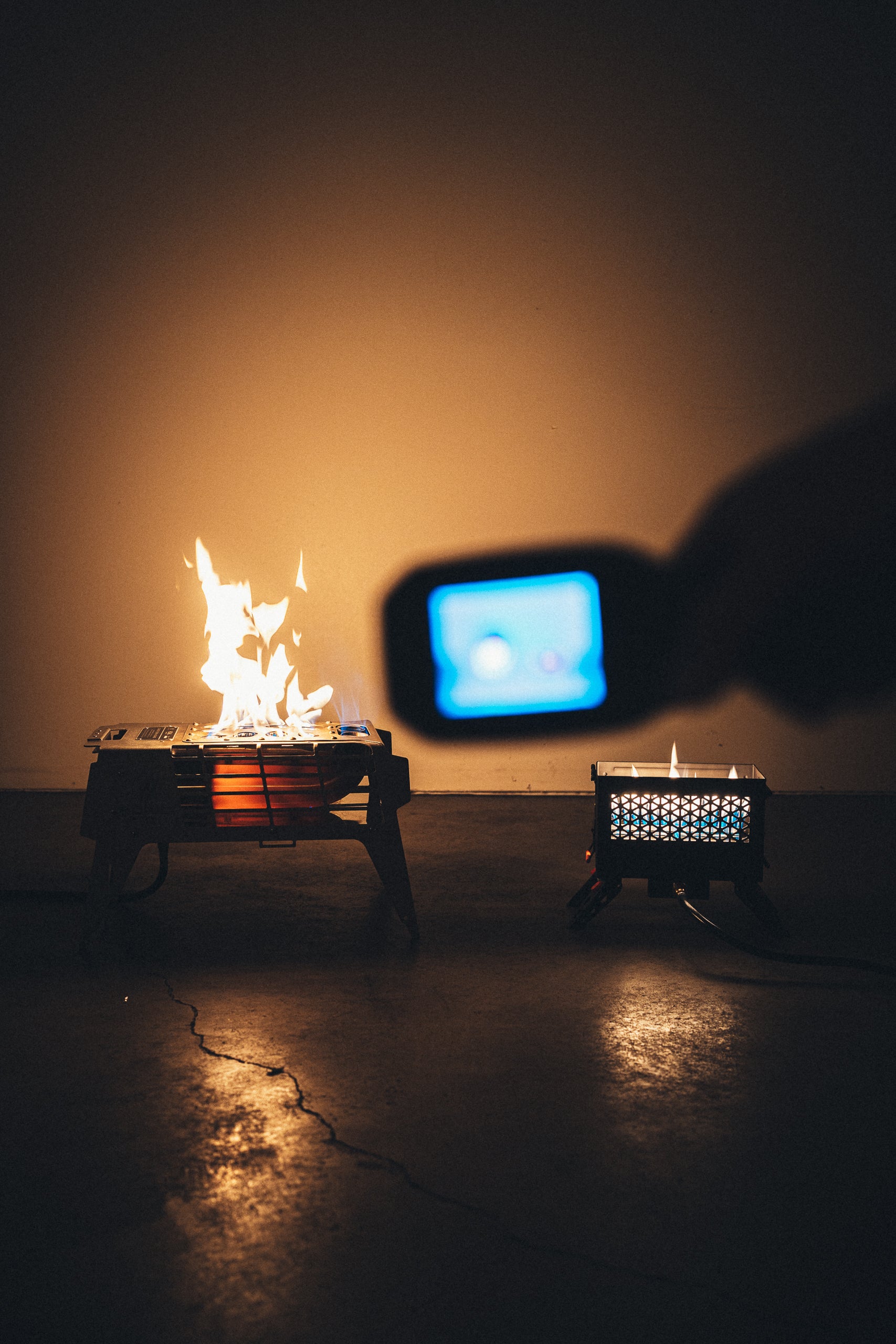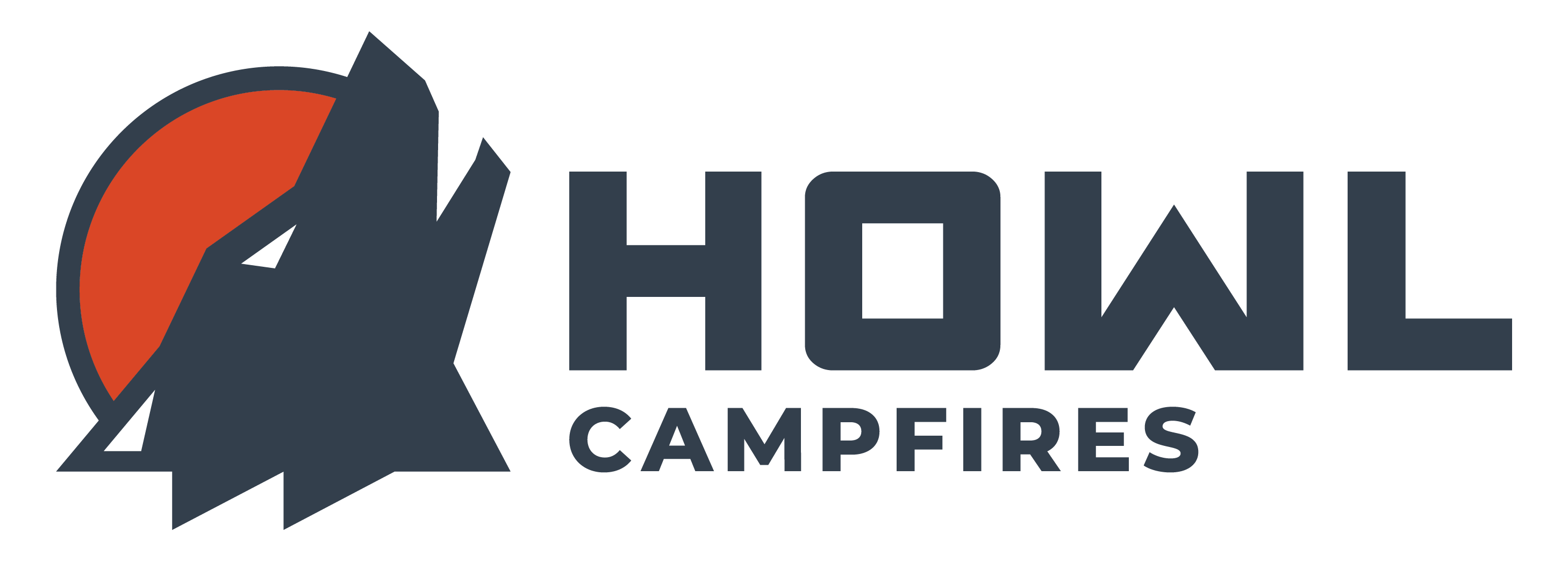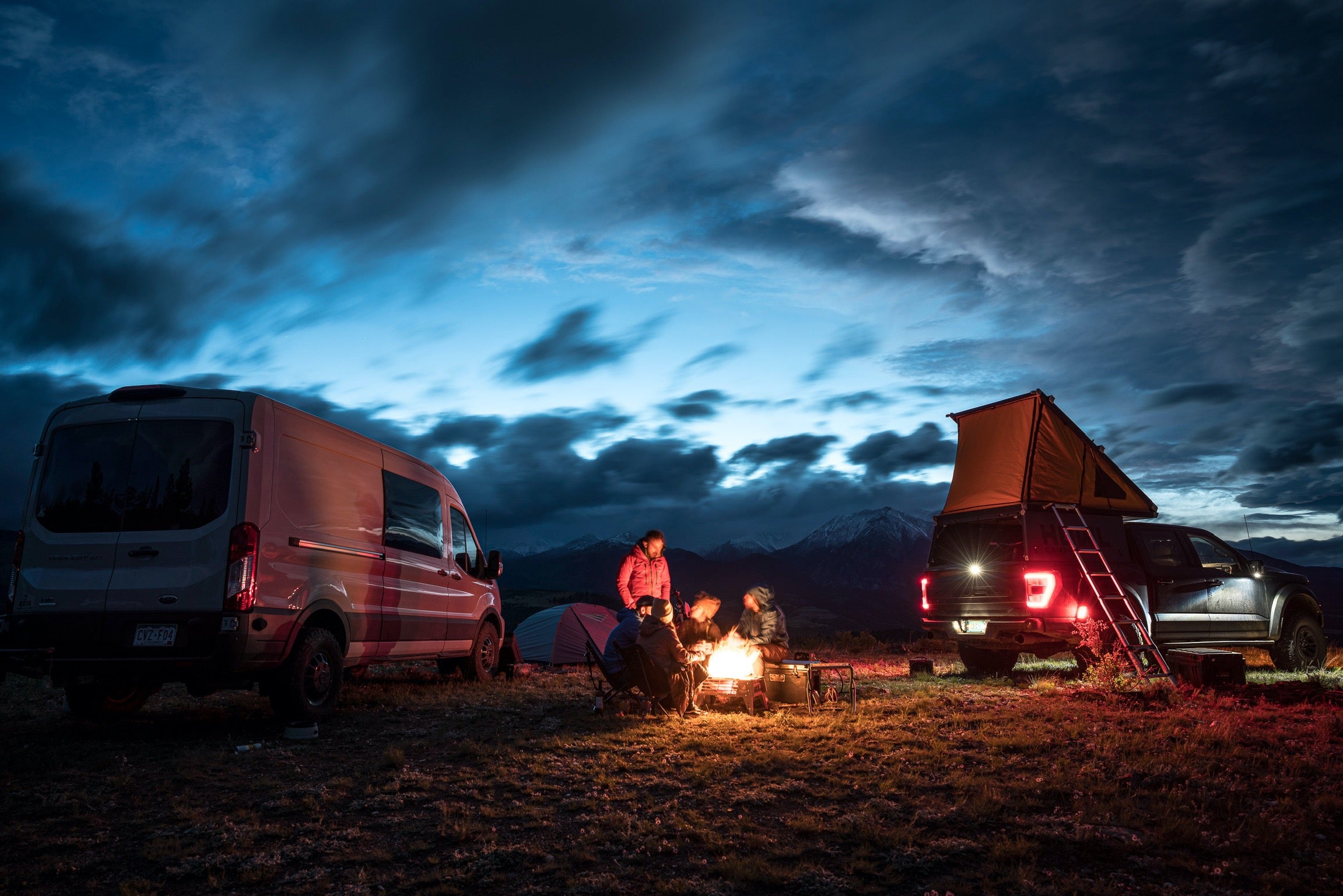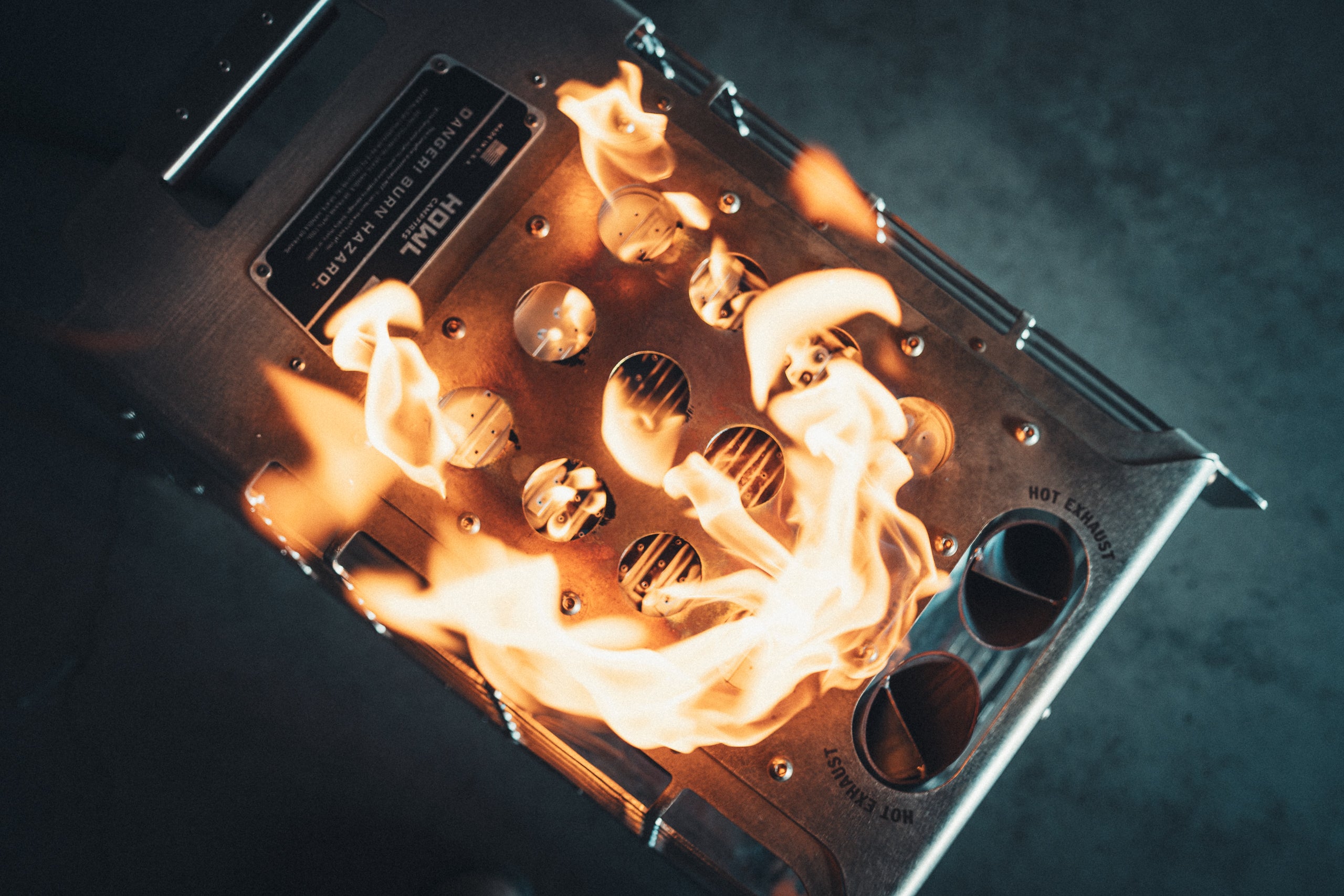
In Late October, things came to a head
The East Troublesome Fire was fresh in our minds as we headed to the Utah desert with friends from GoFast Campers. The land was dry, and even that late in the year, there was still a Stage II Burn Ban in effect. The forecast looked wintry, so we bought the warmest-looking propane fire pit we could find.
That first night, we shivered next to it for as long as we could stand, but there was almost no heat. We retreated to our sleeping bags for warmth, and regretted missing out on time with friends.
The next night, things played out differently...
Dilemma: be cold, or break the law?
We care deeply about the forest and public land access. We spend a lot of time out here, and more than anything, we want to pass these places down to future generations. So we volunteer and donate to conservation organizations.
But that night, we were cold. We wanted to spend time with friends. And once again, the propane fire pit wasn't cutting it. So we broke the law and lit a wood fire. We got warm. But we were very much in the wrong.
That made us realize something: If we weren't willing to use crappy alternatives to a wood fire, how could we expect anybody else to? This was our aha moment...
What if we made a propane fire pit... that worked as well as a wood fire?
Then people could have hot campfires in burn bans! And taking it further: what if it was so good, so convenient, that people liked burning it more than wood? Then land managers wouldn't have to punish or guilt people into using it. We'd all light fewer wood fires, and that would mean less wildfires!
Forests, homes, and lives would be saved. We’d spend less tax money fighting fires, and we'd keep more habitats and places to recreate intact.
Now sure, no one had ever gotten a propane fire to put out heat like a wood fire. No one even knew if it was possible. But we had to try.
THE HOWL CAMPFIRE TOOK three years
In October 2020, we had our aha moment. In October 2023, we shipped the first HOWLs to customers.
What happened in between took a team of four co-founders, a couple design engineers from MIT, a brilliant manufacturing engineer from Cornell, a legend of backpacking stove design, an automotive industrial designer with a cult following, and a handful of other likeminded degenerates.
We didn't have funding. Instead, we shut down our businesses, moved so we could live in the same town, sold off our things, and lived more simply.
2021: The Year of Invention
It took a year to develop a propane device that could replicate the temperature and IR frequencies of wood coals. We called it BarCoal and built dozens of ugly prototypes.
We camped with them in rugged places, caused them to fail, destroyed them in dozens of different ways, and eventually figured out how to make the new tech work in the wildest conditions.
2022: the Year of certification
It took an entire year to squeeze our new technology into the confines of some very old propane regulations. The first BarCoal prototypes worked brilliantly using 15 psi of fuel pressure. But the ANSI standards limited us to just 5 psi – a third of the power. It felt like Apollo 13.
For help, we called fluid dynamics modeling experts, rapid prototype manufacturers, and third-party testing labs. Part by part, we changed the BarCoal's entire design.
The result was a miracle: An even hotter, more stable BarCoal burner than our 15 psi prototypes. Plus, the HOWL was now certifiable for user and forest safety, so one day we could sell it to people. All we had to do was make them...
2023: The Year of manufacturing
Prototypes were easy. But now we needed to make the HOWL's 292 parts repeatably, reliably, and consistently.
Any manufacturing issue could kill the whole mission. So we needed visibility and control. We also wanted everyone who builds HOWLs to have the time and public land access to get out and enjoy it. So we chose to manufacture here in Colorado.
We found remarkable suppliers for each part, explored raw material options, then redesigned each part for the specific machines that would fab it.
We stood up a factory partner to help us clean, finish, and test each part, weld up the BarCoal chassis, assemble the HOWL, and run final burn testing and packaging.
We've been shipping out HOWLs since October 2023, and the feedback from our customers feels incredible. But this is just the beginning.
What comes next?
The future is up to you.
When you use a HOWL, it's a tool for having wood fire warmth in places you never could.
When lots of people use HOWLs, there is a compounding effect. It becomes a tool for reducing wildfire starts, helping us pass our forests and camping way of life down to future generations.
This is YOUR mission, should you choose to accept it:
- Get a HOWL and enjoy the heck out of it. Party in blizzards, party in burn bans.
- Invite your friends to feel its heat. Maybe they need one, too.
- Teach your kids to camp. And when they're ready, pass your HOWL down to them.
Of course, maybe you're not ready quite yet, and that's OK. You might have to think about it, or save up for it. That's all part of the mission. Wherever you're at with the HOWL, whatever you think of it, we're glad you're here. Thank you for reading and getting to know us.
Keep carrying the fire,
– Randall, Alex, Kelly, and Nicholas (the cofounders)
THE HOWL CAMPFIRE TOOK three years
In October 2020, we had our aha moment. In October 2023, we shipped the first HOWLs to customers.
What happened in between took a team of four co-founders, a couple design engineers from MIT, a brilliant manufacturing engineer from Cornell, a legend of backpacking stove design, an automotive industrial designer with a cult following, and a handful of other likeminded degenerates.
We didn't have funding. Instead, we shut down our businesses, moved so we could live in the same town, sold off our things, and lived more simply.
2021: The Year of Invention
It took a year to develop a propane device that could replicate the temperature and IR frequencies of wood coals. We called it BarCoal and built dozens of ugly prototypes.
We camped with them in rugged places, caused them to fail, destroyed them in dozens of different ways, and eventually figured out how to make the new tech work in the wildest conditions.
2022: the Year of certification
It took an entire year to squeeze our new technology into the confines of some very old propane regulations. The first BarCoal prototypes worked brilliantly using 15 psi of fuel pressure. But the ANSI standards limited us to just 5 psi – a third of the power. It felt like Apollo 13.
For help, we called fluid dynamics modeling experts, rapid prototype manufacturers, and third-party testing labs. Part by part, we changed the BarCoal's entire design.
The result was a miracle: An even hotter, more stable BarCoal burner than our 15 psi prototypes. Plus, the HOWL was now certifiable for user and forest safety, so one day we could sell it to people. All we had to do was make them...
2023: The Year of manufacturing
Prototypes were easy. But now we needed to make the HOWL's 292 parts repeatably, reliably, and consistently.
Any manufacturing issue could kill the whole mission. So we needed visibility and control. We also wanted everyone who builds HOWLs to have the time and public land access to get out and enjoy it. So we chose to manufacture here in Colorado.
We found remarkable suppliers for each part, explored raw material options, then redesigned each part for the specific machines that would fab it.
We stood up a factory partner to help us clean, finish, and test each part, weld up the BarCoal chassis, assemble the HOWL, and run final burn testing and packaging.
We've been shipping out HOWLs since October 2023, and the feedback from our customers feels incredible. But this is just the beginning.
What comes next?
The future is up to you.
When you use a HOWL, it's a tool for having wood fire warmth in places you never could.
When lots of people use HOWLs, there is a compounding effect. It becomes a tool for reducing wildfire starts, helping us pass our forests and camping way of life down to future generations.
This is YOUR mission, should you choose to accept it:
- Get a HOWL and enjoy the heck out of it. Party in blizzards, party in burn bans.
- Invite your friends to feel its heat. Maybe they need one, too.
- Teach your kids to camp. And when they're ready, pass your HOWL down to them.
Of course, maybe you're not ready quite yet, and that's OK. You might have to think about it, or save up for it. That's all part of the mission. Wherever you're at with the HOWL, whatever you think of it, we're glad you're here. Thank you for reading and getting to know us.
Keep carrying the fire,
– Randall, Alex, Kelly, and Nicholas (the cofounders)



